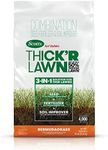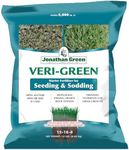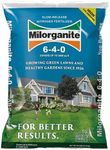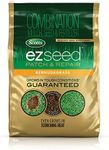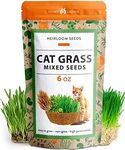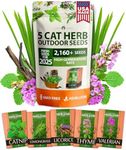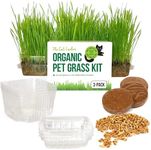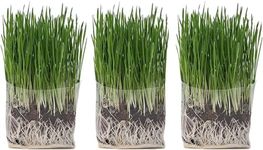Buying Guide for the Best Bermuda Grass Fertilizers
Choosing the right fertilizer for your Bermuda grass is essential to ensure it grows healthy, lush, and green. Bermuda grass is a warm-season grass that thrives in sunny, warm climates and requires specific nutrients to maintain its vigor. When selecting a fertilizer, it's important to understand the key specifications and how they impact the health of your lawn. This guide will help you navigate through the essential specs and choose the best fertilizer for your Bermuda grass based on your lawn's needs.N-P-K RatioThe N-P-K ratio represents the percentage of Nitrogen (N), Phosphorus (P), and Potassium (K) in the fertilizer. Nitrogen promotes lush, green growth, Phosphorus supports root development, and Potassium enhances overall grass health and disease resistance. For Bermuda grass, a higher nitrogen content is usually preferred, such as a 3-1-2 or 4-1-2 ratio. If your lawn is newly established, you might need a higher phosphorus content to encourage root growth. Choose a ratio based on whether you need to boost growth, strengthen roots, or improve overall health.
Slow-Release vs. Quick-ReleaseFertilizers can be either slow-release or quick-release. Slow-release fertilizers provide nutrients over an extended period, reducing the risk of burning the grass and requiring less frequent applications. Quick-release fertilizers deliver nutrients immediately, which can be beneficial for a quick green-up but may require more frequent applications and carry a higher risk of burning the grass if over-applied. If you prefer less maintenance and a steady nutrient supply, opt for slow-release. If you need rapid results, a quick-release fertilizer might be more suitable.
Application FrequencyThe frequency of application depends on the type of fertilizer and the specific needs of your Bermuda grass. Slow-release fertilizers typically need to be applied every 6-8 weeks, while quick-release fertilizers may need to be applied every 4-6 weeks. Consider your availability and willingness to maintain a regular fertilization schedule. If you prefer less frequent applications, a slow-release fertilizer is a better choice. If you are committed to a more frequent schedule, quick-release fertilizers can provide faster results.
Soil Test ResultsConducting a soil test can provide valuable information about the nutrient levels and pH of your soil. This information helps you choose a fertilizer that addresses any deficiencies and balances the soil's nutrient profile. For example, if your soil test indicates low nitrogen levels, you should select a fertilizer with a higher nitrogen content. Tailoring your fertilizer choice to your soil's specific needs ensures optimal growth and health for your Bermuda grass.
Organic vs. SyntheticFertilizers can be organic or synthetic. Organic fertilizers are made from natural materials and release nutrients slowly, improving soil health over time. They are environmentally friendly and reduce the risk of over-fertilization. Synthetic fertilizers are chemically manufactured and provide nutrients quickly. They are often more concentrated and can deliver faster results but may require more careful application to avoid burning the grass. If you prefer a more natural approach and long-term soil health, choose organic fertilizers. If you need immediate results and are comfortable with precise application, synthetic fertilizers may be more appropriate.


